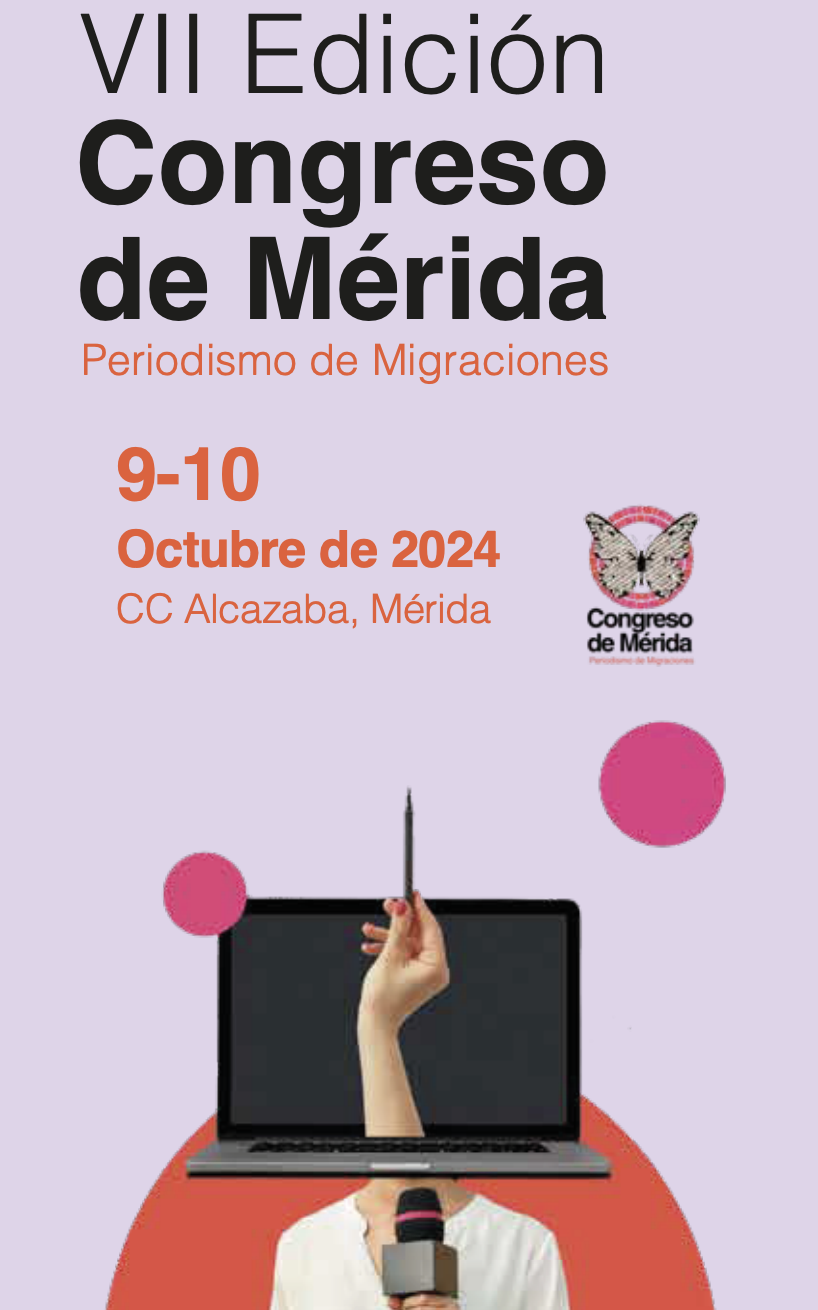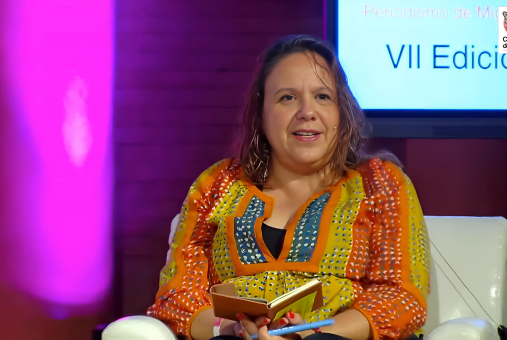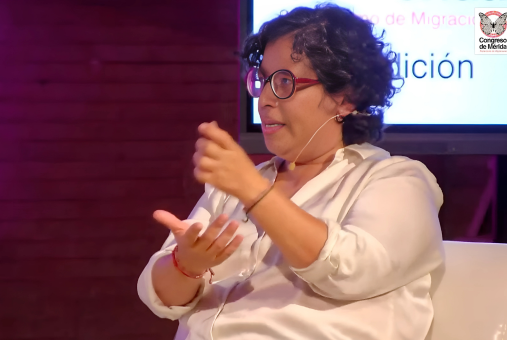Collaborative journalism, feminist perspectives, diverse newsrooms, and support from local journalists are practices that can lead to better coverage of migration, according to journalists from Latin America and Spain who participated in the seventh Migration Journalism Congress last week in Mérida, Spain.
Journalists from across the Spanish-speaking world took part in panels and discussions where they shared experiences and best practices for reporting on migration.
Mexican journalist Rocío Gallegos, director of the investigative digital media outlet La Verdad in Ciudad Juárez, Mexico, spoke about the importance of collaborations and partnerships to improve coverage of migration-related issues.

the 7th Migration Journalism Congress took place last week in Mérida, Spain. (Photo: Screenshot of porCausa website)
Gallegos explained how La Verdad's collaborative partnerships with El Paso Matters in El Paso, Texas, and the Netherlands-based collaborative investigative journalism agency Lighthouse Reports made it possible to produce a forensic investigation that accomplished results a single outlet could not have achieved alone.
The project titled “We’re Not Letting Them In... What Happened the Night of the Fire at the Migrant Facility in Ciudad Juárez?” was a multimedia report that uncovered abuses and omissions by authorities at a migrant facility along the U.S.-Mexico border where 40 migrants were unable to escape a fire and died.
“We knew we had to reconstruct that moment to be able to respond, but we were also aware that La Verdad couldn't do it alone,” Gallegos said during the panel “The Challenge of Investigating with Others.” “We sought out allies with different skills that were complementary to ours and, above all, with the ability to share funding.”
Gallegos said that in the three-way collaboration, her outlet contributed knowledge of the case and the territory, as well as sources and reporters to conduct the investigation. El Paso Matters, she said, contributed its expertise in migration and cross-border reporting, while Lighthouse Reports provided tools, technology and funding for forensic reconstruction.
Thanks to this reconstruction, the report was able to debunk official narratives about the fire and demonstrate that the 40 migrant deaths could have been avoided.
Gallegos said that for a small independent outlet like La Verdad, collaborating with organizations that are not media outlets allows for more freedom than working with larger media companies.
“We’ve had the experience of working solely with major outlets, where they would come in and say, ‘This is the vision, this is what we want,’” she said. “Working with an organization that is not a media outlet but rather promotes collaboration allowed us to do it with more freedom. It gave us the space where we could listen to each other as equals.”
Including local journalists in collaborative investigative reporting teams on migration is also valuable for amplifying voices that might otherwise go unnoticed, said Ángela Cantador, a journalist with the Latin American Center for Investigative Journalism, or CLIP for its initials in Spanish, on the same panel.
Cantador and Spanish journalist and data investigator Jesús Escudero, from the International Consortium of Investigative Journalists (ICIJ), presented the project “Trucks, Traps for Migrants,” conducted by both organizations in partnership with Noticias Telemundo, the Dutch open-source journalism expert Bellingcat, and local media outlets Pie de Página, Chiapas Paralelo and En un 2×3 Tamaulipas, as well as Plaza Pública from Guatemala, and Contracorriente from Honduras.
The investigation revealed that human trafficking in precarious and dangerous conditions using cargo trucks from Central America to the United States was more common than previously documented. This came after the deaths of 53 migrants found trapped in a truck in San Antonio, Texas, in 2023. The organizations sought to collect testimonies from other migrants who had traveled in similar conditions and realized they needed a transnational approach, while also investigating hyper-locally in the countries of origin of most migrants crossing through Mexico.
“The importance and outcome of this collaboration is perhaps finding those stories that sometimes go unnoticed, because we tend to focus on the voices we consider important, but the truth is there are many others,” Cantador said. “When you work with local journalists who know the area and have access to communities and certain sources, you can seek out those stories that also matter.”

Mexican Journalist Marcela Turati explained how collectives can improve the coverage of migration issues. (Photo: Screenshot of porCausa YouTube channel)
Mexican journalist Marcela Turati said her way of conducting large-scale, long-term investigations is by forming collectives of journalists investigating the same topic from different angles.
Turati, author of the book "San Fernando: Last Stop" about the smuggling and disappearance of migrants in Mexico, founded the collective Másde72 with a group of colleagues who also cover disappearances. The primary goal was to help each other in their investigations and provide security support.
“These stories are costly, they’re long-term. I did them collectively because I couldn’t do it alone,” Turati said during the panel “Incomplete Mourning: Disappearances on the Migrant Route.” “What we do in a network is try to protect each other, because security is very important. We try to provide monitoring, even if we don’t know each other, even if we’re in different parts of the country.”
Migration has a key gender component when considering the reasons people migrate, said Spanish journalist María de los Ángeles Fernández, head of the feminist digital magazine Pikara and co-creator of the Spanish media outlet Desplazados.org, which specializes in migration.
There are reasons why women migrate that don’t apply to male migrants, such as forced marriages, domestic violence, persecution for their gender identity or becoming part of global care chains, Fernández said.
“The feminist perspective adds to our understanding not only of the classic system of power, but also another axis of power that is clear to me, which is patriarchy,” Fernández said during the panel “Señoros: We Need Feminist Lenses in Migration Journalism.” “Incorporating that perspective helps you rethink new questions, seek out new topics, new approaches.”
Argentinian journalist Luciana Peker, an expert on gender issues, said in the same panel that the feminist journalism agenda should not only cover women and sexual diversity issues but must have an intersectional perspective, especially when far-right governments are taking the same violent stances against migrants as they are against feminist movements.
Therefore, she added, adopting a feminist perspective allows for anticipating the emergence of potential scenarios of violence.
“I think we’re again monopolizing the attention, the writing, and the political analysis from a male perspective that does not understand the dynamics of the world we are living in,” Peker said. “Lacking a feminist perspective today means missing the chance to anticipate where new violence will come from.”
Peker said it is necessary to motivate audiences to consume media that covers migration and feminism, as well as to read female migrant journalists from Latin America because it is important for those voices to be supported.
“In a time when we count how many times an article is read, let’s show that we care about the voices of migrants, that we read them and want to listen to them,” she said.
In the panel “The Challenge of Building Diverse Newsrooms,” participants discussed the importance of media outlets covering migration to have diverse newsrooms, as this influences the narratives in migration reporting.

Mexican journalist Amarela Varela said that migrants are neither given a voice to be the protagonists of their own stories nor the opportunity to lead newsrooms. (Photo: Screenshot of porCausa YouTube channel)
For journalist and professor Amarela Varela of the Autonomous University of Mexico City, diversity in a newsroom is not about meeting a racial or gender quota, but about ensuring that those making editorial decisions include diverse people who are more open to giving voice to all types of population groups in their coverage.
According to Varela, when migration phenomena such as the migrant caravan—the journey of large groups of migrants from Central America to the United States each year—are covered in Mexico, the media tends to give voice to institutions, officials, and experts, but rarely to migrants themselves.
“Migrants are treated as clients of the trafficking industry. Some treat them as subjects of study, like we academics do,” she said. “Some treat them as a source, some treat them as victims to be protected and guided, but almost no migrants are given the voice of being protagonists, owners of their knowledge, or able to direct newsrooms.”
Journalist Nacho Calle, deputy director of the Spanish digital media outlet Diario Público, spoke on the panel about the importance of building diverse newsrooms beyond focusing on hiring people from specific population groups, but rather through training teams in diversity perspectives.
“A newspaper isn’t feminist because all its workers are women. You have to train in feminism and hire people with a feminist perspective,” Calle said. “We’ve seen media outlets trying to pass themselves off as feminist because they are led by a woman. And that isn’t necessarily a requirement.”
Colombian journalist Andrea Aldana, who lives in exile in Spain, criticized the fact that in that country, only Spanish reporters mostly cover migration.
“I understand that migration is covered by Spanish journalists because they are the recipients of the phenomenon. Being proportionate, it’s as if gender issues were being covered by men,” she said. “I think that’s part of why you rarely see migrants in the reports on the topic.”
PorCausa, the non-profit organization based in Spain that focuses migration issues, has spent nearly 10 years sharing its reports and research with a network of Ibero-American journalists and media outlets.
PorCausa’s methodology, known as the circular narrative, seeks to counter hate speech and change the dominant perception of migration through a combination of journalistic and academic approaches, according to Lucila Rodríguez-Alarcón, the organization’s executive director.
The circular narrative is a process of research, deconstruction and reordering of information that is repeated as many times as necessary until a narrative line of what is to be transmitted is found, Rodríguez-Alarcón said.
In September this year, PorCausa presented the report "Migrations: Keys to a Humane and Effective Political Discourse", which proposes an alternative vision for addressing the challenges of human mobility by offering examples of different approaches that have proven successful.

PorCausa intends to export its methodology, known as "circular narrative", to Latin America. (Photo: Screenshot of porCausa website)
The report emerged after the organization found that Chile—where they had been consulting for a local foundation—was experiencing a narrative around migration very similar to that which Spain faced 10 years earlier, when far-right parties sowed anti-immigrant rhetoric full of demagoguery and misinformation, Rodríguez-Alarcón explained to LatAm Journalism Review (LJR). The report does not focus specifically on Chile, and is instead a compilation of narrative approaches to Latin America.
“As migration in Chile has been very rapid and the far-right is generating a very strong narrative, it turns out the far-right narrative is already gaining significant traction,” she said. “We decided to contribute our knowledge and methodology with the aim of creating a space where quality information can be recovered, and that information can be disseminated, changing the narrative framework imposed by a far-right political candidate.”
Rodríguez-Alarcón said they are working on another report specifically about Chile, which they plan to publish in April 2025.
“We will continue working as we are now, within journalism networks in Ibero-America,” Rodríguez-Alarcón said. “Journalism networks are a strength.”